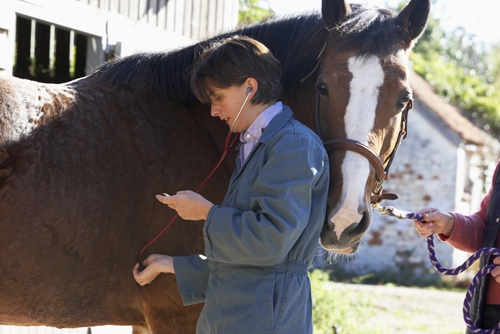Getting a Doctorate of Veterinary Medicine isn’t easy, but it’s incredibly rewarding. If you’ve spent your life around horses but have no desire to compete or teach others to ride, nothing could be more fitting than making horse healthcare your profession. For some, becoming a veterinarian is the best way to give back to the animal companions that have supported them throughout their lives.
“Most equine veterinarians have a bachelor’s degree in addition to their vet degree.”
Veterinary school
As the Dallas Equestrian Center notes, most equine veterinarians have a bachelor’s degree in addition to their veterinary degree. However, you don’t need a specific degree to enter veterinary school. If you decide you want to be a horse vet during your senior year of art school, go for it!
Be aware, however, that veterinary schools are intensely competitive. There are only 30 accredited institutions within the U.S., and the states that do have veterinary colleges generally only have one. California and Tennessee are the only exceptions – both states have two schools with vet programs. Therefore, it’s a good idea to study biology, zoology, nutrition, chemistry, genetics and physics during your undergraduate years to increase your chances of acceptance.
Each school has its own admission and graduation requirements, so browse through their websites and online course catalogs for some preliminary information. Many schools look for a background in science as well as extensive prior experience with animals. You will also need to take a standardized test like the GRE, the MCAT or the Veterinary College Admission Test.
Of course, choosing a school is no easy feat. Due to their limited number, it’s best to have a few backups in case you don’t get into your first choice. Students must be prepared to travel and spend a lot of time away from home, as many states – including South Carolina, New Mexico, Hawaii and more – don’t have their own vet schools.
“The SAVMA helps students develop professionally while still getting their education.”
The American Veterinary Medical Association
The AVMA, a not-for-profit established in 1863, represents the more than 88,000 vets within the U.S. Their child organization, the Student American Veterinary Medical Association, helps students develop professionally while still getting their education. Member students can attend conventions, access the AVMA‘s online career center and knowledge base, receive discounts on both the Journal of the AVMA and the American Journal of Veterinary Research, and more.
The challenges
According to the American Farriers Journal, vet students spend about $234,000 on school and living expenses over the course of their studies. In addition, the starting salary of an equine vet is significantly lower than that of a small animal vet or one who works on a food-producing farm. Still, the benefits of a satisfying career outweigh the costs,
Overall, getting an education in horse health requires a lot of dedication, studying and conviction. Choosing to enter vet school isn’t a decision to make lightly, but it can lead to an amazing career.









